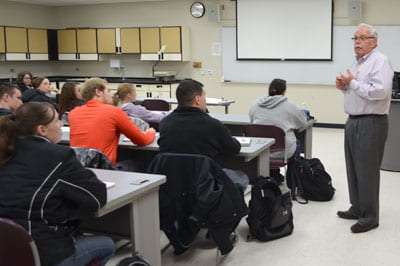CEO 101: Legendary Costco leader talks business with UW-Green Bay students

UW-Green Bay students — at least the 30 or so senior Business Administration students who filled every seat in Wood Hall Classroom 440 — got the lesson of a lifetime on a recent Thursday afternoon.
The students enjoyed an informal, hour-long session with internationally known retail innovator Jim Sinegal, the co-founder and longtime CEO of Costco Wholesale.
Sinegal, arguably among the most prominent corporate executives ever to visit campus, shared the Costco success story, told the students that treating employees right is every bit as important as treating customers right, and said there’s no shortcut to success.
“What advice do I give young people starting out in business?” he said in response to a student question. “A good mentor is important. Also, it’s no bed of roses. You’re going to work way more than 40 hours a week. So you’d better have a passion for what you’re doing.”
Sinegal’s visit was arranged by faculty member Larry McGregor of the Austin E. Cofrin School of Business. McGregor had wandered up and introduced himself at the grand opening of Costco’s Green Bay store last year. His sales pitch and persistence persuaded Sinegal to return to the area as the keynote speaker for UW-Green Bay’s Business Week Dinner in March.
The annual dinner is an invitation-only opportunity for top students to professionally network with a cross-section of local business leaders, and for the business community to learn more about the Austin E. Cofrin School of Business.
It was on the afternoon of that second Green Bay visit that the famous CEO found himself serving as guest lecturer for McGregor’s Business Administration 490 course, Strategic Decision Analysis.
Sinegal does about 15 to 20 business school talks a year, typically major MBA programs but also smaller regional campuses and community colleges. Along with UW-Green Bay on his recent itinerary were MIT, USC, the University of Michigan, Seattle University and the University of Washington.
Click thumbnails to enter slideshow view.






Before inviting questions from the class, Sinegal shared the story of his own career, and his corporate and personal philosophy.
He and Seattle retailer Jeff Brotman opened the first Costco in 1983. Sinegal served as president and CEO until his January 2012 retirement. He remains with the company as a director and consultant and says he still travels 200 days a year to visit Costco stores worldwide.
“I’m 78 years old,” he told the students, “and I’ll still be visiting Costcos ten years from now. It’s what I like to do.”
Costco today has revenues in excess of $105 billion and operates 650 warehouse/stores in 42 states, Puerto Rico and nine countries. The company employs more than 195,000 people worldwide and has earned a reputation as a fair and progressive employer.
Sinegal was named one of Business Week’s “Best Managers” in 2003. He was named to Time Magazine‘s 2006 list of the 100 most influential people and for the past half dozen years has been selected as one of the 30 most respected CEO’s by Barron’s Magazine. Morningstar Investments named him Outstanding CEO of the Year for 2011.
McGregor and his students asked a number of questions about the Costco model of generous pay and benefit packages, a model rare in the ultra-competitive world of high-volume retail.
“Hire good people and good things are going to happen in your business,” Sinegal said. “We better do a good job on people, because that’s 70 percent of our business (expenses)… We hire smart people who are dedicated and want to make a career with our company.”
The company has the highest retention in retail, thanks in part to career advancement opportunities that start with a policy of promoting from within. The stated objective is 85 percent, but Sinegal says “ninety-nine percent is more like it.”
He told of Costco getting countless resumes from high-flying, newly minted MBAs who dream of stepping straight into mid- to upper-management with the company but soon learn that’s not how it works, at least at the beginning. To join Costco, you must first learn the basics.
“We have vice presidents of our company who started with us by pushing shopping carts in the parking lot,” said Sinegal.
That regular-guy mindset was also visible in Sinegal’s attire as he addressed McGregor’s class, with the same Costco-issue ID tag clipped to his shirt as any entry-level stockroom worker would wear.
He acknowledged that there’s an argument to be made that a strict promote-from-within ethos can tend to make an organization insular, by limiting new and outside perspectives, but he says Costco works hard to counter that tendency. And the advantages of the homegrown-talent approach are undeniable.
“We have high wages and low prices,” he told the students. “The only way that works is with very high productivity, and great people.”
Summarizing his philosophy of success, Sinegal offered four simple rules for business: 1) Obey the law; 2) Take care of your customers; 3) Take care of your employees; 4) Respect your suppliers.
“Do all those things,” he said, “and you’ll do a great job of taking care of your shareholders.”
Sinegal told the class he owed much of his success in retail to his first boss, Sol Price, who himself would go on to found the highly successful Price Club chain. Sinegal said identifying a mentor who does things the right way and has the ability and willingness to share those lessons can be a key.
Just don’t get too carried away, he jokingly advised the UW-Green Bay students.
“Sol was absolutely my mentor,” Sinegal continued, “but if I had been so eloquent as to turn to him and say, ‘Sol, you are my mentor,’ I know what his response would have been…
‘Cut the (excrement), Jim, and get back to work!”
Photos by University Communication student photographer Veronica Wierer


